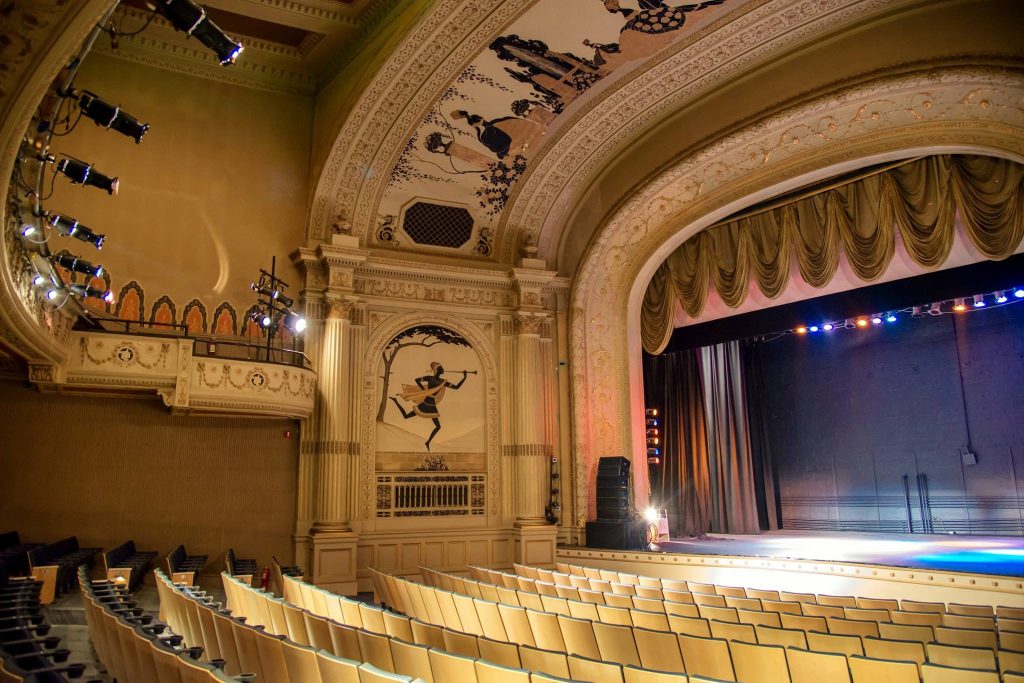Behind the closed doors of The Cabot performing arts center in downtown Beverly, a transformation is occurring. The bland drop ceilings that have hung above the lobby for years are being removed and the magnificent vaulted ceiling they concealed is being painstakingly restored. The opulent neo-classical chandelier that hung in the space in the 1930s is to be hung again. One rose window will be uncovered and a second re-installed where archival photos show it used to be.
“You’re going to see something that looks really similar to what was there in the past,” says the center’s executive director J. Casey Soward.
Like all performing arts spaces in the state, The Cabot was forced to shut down as coronavirus numbers surged in March. Since then, Soward and his staff have been scrambling to find ways to remain a vital resource for the community and pave the way toward an uncertain future. The lobby restoration project is one of the many ways the iconic North shore theater is facing the challenges of the COVID-19 pandemic and finding ways to adapt and strengthen connections with the community.
The Cabot had already raised the money it needed to complete the lobby renovations early this year and was starting to strategize how and when to execute the project, when the pandemic struck. They decided to take advantage of the forced closure to complete the restoration.
The timing of the restoration offers an almost eerie parallel to the beginning of the theater’s life, Soward notes. This year The Cabot celebrates its 100th anniversary. When it was built in 1920, it was part of a trend toward ever grander movie palaces as the film industry tried to lure back customers after the 1918 influenza pandemic.
The Cabot has also adjusted its programming in light of COVID. In early August, it debuted the Porch Sessions, outdoor performances for a limited audience at historic Hale Farm just a few blocks away from the theater. The first show featured singer-songwriter Tom Rush playing for 100 people.
Shortly thereafter, however, the state lowered the number of people who could gather outdoors to 50, and Soward and his staff had to change plans again. They limited future audiences to 40 people, secured sponsorship agreements to help make up some of the lost revenue, and soldiered on.
Attendees sit at tables of up to six people, all spaced 15 feet from each other to ensure a worry-free concert experience. For the first half of the series, food service was provided by Root, a culinary education and catering organization from Salem. Local favorite A&B Burgers is taking over for the rest of season.
The artists who have performed are all used to playing for crowds of hundreds or thousands, Soward says, and have been very gracious about accommodating the small sizes of the Porch Sessions shows. Artists including Mark Erelli and Chris Smither have performed so far; Chelsea Barry, Martin Sexton, Jon Butcher, and Ryan Montbleau are scheduled for October.
And the reaction from the community has been heartening.
“The people who have come have just been overjoyed that they can see live music in a safe way,” Soward says. “It’s been an amazing thing to be a part of.”
Since early in the pandemic, the Cabot has also been offering virtual programming. They have offered an eclectic selection of acclaimed films for streaming at home. Current offerings include the documentaries Jimmy Carter: Rock & Roll President and RBG.
Looking ahead, the theater has invested in equipment to allow for live-streaming of events. It expects to use the technology for a major virtual concert in December (further details—including the promise of A-list performers—to follow soon).
Once the lobby restoration is complete, the theater might re-open for movie screenings. With a maximum allowed audience of 25 in an 850-seat theater, the Cabot is almost an ideal place to enjoy a film at a comfortable social distance, Soward notes. And upgrades to the heating and ventilation systems will make the venue even safer, he says.
Though the recent months have been challenging financially and logistically, the crisis has only strengthened the theater’s ties to its supporters and audiences, Soward says. The community has been there to support the theater, and The Cabot is committed to returning the favor.
“We’re continuing to find creative ways to program and bring what we do and our mission to the public in ways they feel safe,” he says. “We just want to be there every step of the way.”

